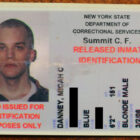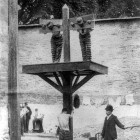
NEW YORK - On Monday, the first day of the Harry Frank Guggenheim Symposium on Crime in America, held at the John Jay College of Criminal Justice, a standing-room-only crowd of criminal justice experts, academics, advocates and journalists spilled out of the small conference room and into the large, modern glass and metal entry hall. They were there to discuss how to fix the United States’ rapidly growing prison population, among other problems.
The conference, titled “The Problem That Won’t Go Away: How drugs, race and mass incarceration have distorted American justice (and what to do about it)," featured six panels over two days tackling areas of the criminal justice system that, the panelists say, are ripe for reform and critically important. But the two subjects discussed most were drugs and prisons. Panels Monday included “America’s Addictions,” "Gangs, Drugs and Urban Violence” and “Crime and Criminal Justice Trends 2011-2012.”
Within the juvenile justice field, Dr. Jeffrey Butts, Director of the John Jay Center on Research and Evaluation said there was some good news. “National trends in youth crime show that juvenile arrests are down since the 90s,” he said.









